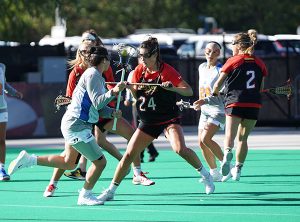Fueling Your Student-Athlete
 Participating in a school sports programs is a great way for adolescents to develop muscular strength, boost confidence and inspire camaraderie. When participating in sports on any level, eating the right balance of nutrients is essential.
Participating in a school sports programs is a great way for adolescents to develop muscular strength, boost confidence and inspire camaraderie. When participating in sports on any level, eating the right balance of nutrients is essential.
For athletes looking to build muscle and strength, understanding caloric intake and proportions of different macronutrients (carbohydrates, fats and protein) is key. Young athletes, in general, need more calories than adult athletes because of their faster growth and metabolic rates. Eating regular, well-balanced meals each day helps the body get nutrition, balances blood sugar levels and provides the foundation for a strong, healthy body.
Carbs Fuel Explosive Power.
Carbohydrates are the main source of energy for an athletes’ explosive power. About 45-65% percent of the athlete diet should be whole forms of carbohydrates, such as whole grains, quinoa, legumes (beans and lentils), fruit, and starchy vegetables, such as sweet potatoes. Carbohydrates that come naturally with fiber, such as oats and winter squash, help control blood sugar for long-term energy.
Healthy Fats Are Critical to Endurance.
During the first two minutes of high-intensity exercises, all energy generated comes from carbohydrates. As exercise time increases, however, the calories the body burns start to transition from carbohydrate stores to the fat stores—meaning that it’s important for athletes to also include healthy fats in their diet. At most, 30 percent of total caloric intake should come from healthy fats such as nuts, salmon, avocado, omega-3 eggs and grass-fed meats. All of these also help with inflammation and are good for joint health.
Protein Builds and Repairs Muscle.
In our western diet, protein deficiency is generally not an issue; we eat plenty of protein. Also keep in mind that protein is not the main energy source for the body, unlike carbohydrates so young athletes should not overdo protein in hopes of gaining muscle faster. For young athletes up to age 18, protein should comprise 10–30% of total energy intake. Some good sources of protein are lean meat and poultry, fish, eggs, dairy products, and beans and nuts.
Healthy Fluids Oil the Machine.
For the most part, it is a myth that sports drinks keep athletes hydrated better than water. Generally, sports drinks should be considered only for high-endurance and high-intensity sports in which the participant is sweating heavily and exerting themselves for greater than 90 minutes. Otherwise, water is enough to hydrate … plus it’s cheap and readily available! And while some youth often think that sugary or caffeinated beverages will give them an energy boost, these in fact can cause a rapid rise in blood sugar, which can lead to a subsequent energy crash.
A good rule of thumb? Drink when you are thirsty. If properly hydrated, urine should be very light yellow to clear in color. If it’s yellow or dark yellow, you need more fluids.
Without proper fuel and nourishment, the body cannot attain its full athletic potential and is more susceptible to fatigue and injury. To learn more, the dietitians at PacMed are available to support your young athlete. Should any of the athletes in your family experience injury, the doctors in our Sports Medicine department can help diagnose and treat them.


